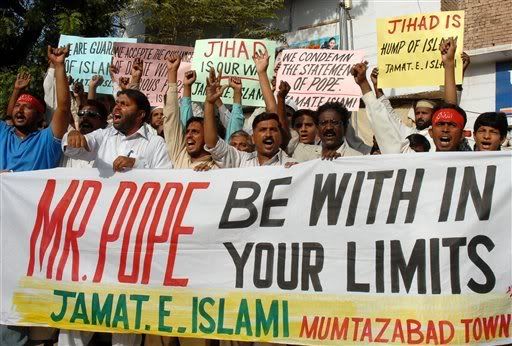by Waleed Aly
September 18, 2006
The Pope should mind his words. So should some of his Muslim critics.
LET me get this straight. Pope Benedict XVI quotes the 14th century Byzantine Emperor Manuel II Paleologus asserting before a Persian Islamic scholar that the prophet Muhammad brought nothing new to the world except things "evil and inhuman, such as his command to spread by the sword the faith he preached". Some Muslims clearly interpret Benedict to be quoting Manuel with approval, and take offence at the suggestion that Islam is inherently violent. The response is to bomb five churches in the West Bank, and attack the door of another in Basra. In India, angry mobs burn effigies of Pope Benedict. In Somalia, Sheikh Abu Bakr Hassan Malin urges Muslims to "hunt down" the Pope and kill him, while an armed Iraqi group threatens to carry out attacks against Rome and the Vatican.
There. That'll show them for calling us violent.
Meanwhile, other commentators seem to be vying to be most hysterical. Libya's General Instance of Religious Affairs thinks Benedict's "insult … pushes us back to the era of crusades against Muslims led by Western political and religious leaders". And a member of the ruling party in Turkey has placed Benedict "in the same category as leaders like Hitler and Mussolini", in what must surely be an insult to those who suffered under them.
Closer to home, Muslim Community Reference Group chairman Ameer Ali cautioned Benedict to "behave like (his predecessor) John Paul II, not Urban II (who launched the Crusades)", while Taj al-Din al-Hilali declared startlingly that the Pope "doesn't have the qualities or good grasp of Christian character or knowledge". It's fair to say perspective has deserted us.
Parallels with February's Danish cartoon saga are begging to be drawn. As Saudi Arabia, Iran, Libya and Syria did with Denmark, Morocco has now withdrawn its ambassador from the Vatican. Egypt and Turkey called for an apology. Indeed, one expert has suggested Morocco's
decision may have been a tactic to prevent a wave of street protests similar to those that stunned the world in February. There is an awful sense of history repeating: a provocative gesture triggers an overblown response of surreal imbecility.
But this is not the same as the Danish catastrophe. On that occasion, the cartoons' publication was an act calculated specifically to offend Muslim sensibilities. The reaction was irredeemably contemptible, but the sense of offence was justified.
Pope Benedict's speech was an academic address at a German university on an esoteric theological theme that had nothing to do with affronting Muslims. The apparently offending remarks were almost a footnote to the discussion. The contrast is manifestly stark.
But it seems some elements in the Muslim world are looking avidly for something to offend them. Meanwhile, governments looking to boost their Islamic credentials are only too happy to seize on this, or nurture it, for their own political advantage. At some point, the Muslim world has to gain control of itself. Presently, its most vocal elements are so disastrously reactionary, and therefore so easily manipulable.
Here, the vociferous protests came from people who, quite clearly, have not bothered to read Benedict's speech. Worse, some (like al-Hilali and Ameer Ali) themselves regularly complain of being quoted incorrectly and out of context. Had such critics done their homework, they would have noted Benedict's description of Manuel II's "startling brusqueness". Manuel's point was that violent doctrine could not come from God because missionary violence is contrary to rationality. Benedict's point was a subtle one: that Manuel draws a positive link between religious truth and reason. This was the central theme of the Pope's address. He was silent on Manuel's attitude to Islam because it was beside the point he was making. Clearly, Manuel II was not a fan of the prophet Muhammad. But that does not mean Benedict isn't either.
The trouble with being the Pope is that you are simultaneously a theologian and a politician. Theological discourse is regularly nuanced and esoteric. Political discourse
is not. Turkish Prime Minister Tayyip Erdogan said "the Pope spoke like a politician rather than as a man of religion", but the truth is the exact opposite. In theological terms, Benedict chose an example well suited to his narrow argument.
In political terms, his choice was poor. He was naive not to recognise how offensively it would translate into the crudeness of the public conversation, and should at least have made clear that he was not endorsing Manuel II's words.
I happen to think Manuel had a shoddy grasp of Islamic theology. Indeed, the Islamic tradition would have much to contribute to the theme of Benedict's lecture. While medieval Christendom fought science stridently, the relationship between faith and reason in traditional Islam was highly convivial.
That's why I would be interested to have heard how the Persian scholar responded to Manuel's argument. I'm fairly certain, though, he wouldn't have called on Muslim hordes to hunt down Manuel and kill him.
Waleed Aly is an Islamic Council of Victoria director.

3 comments:
Dude hits the nail on the head. Again!
Now all you need is another half a billion Waleed Alys to change what the world thinks about Muslims.
Hey, you're forgetting me! So it's half a billion Waleed Aly's MINUS me! lol
And yeah, that was a pretty damn good article.
lol...yes 499,999,999 more Waleed Aly's to go then!
Post a Comment